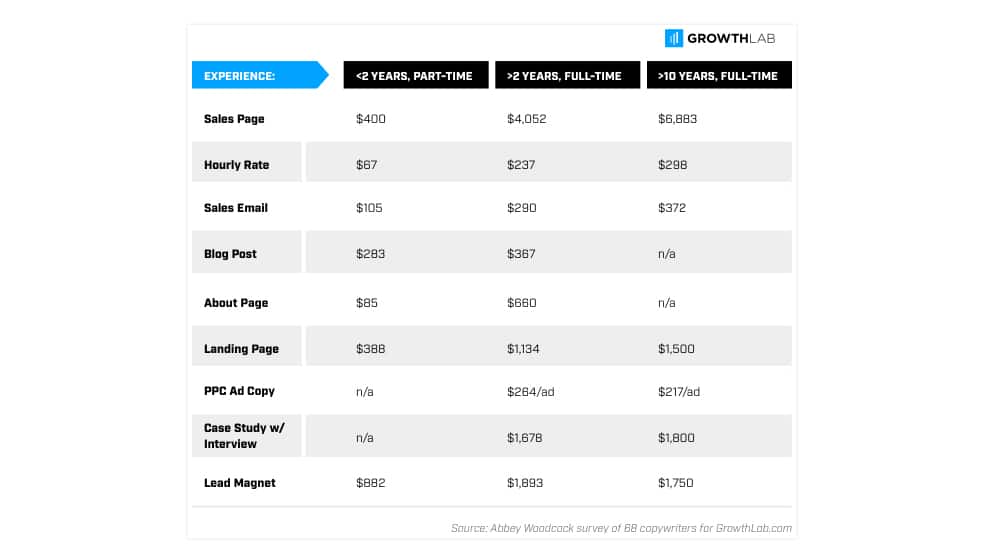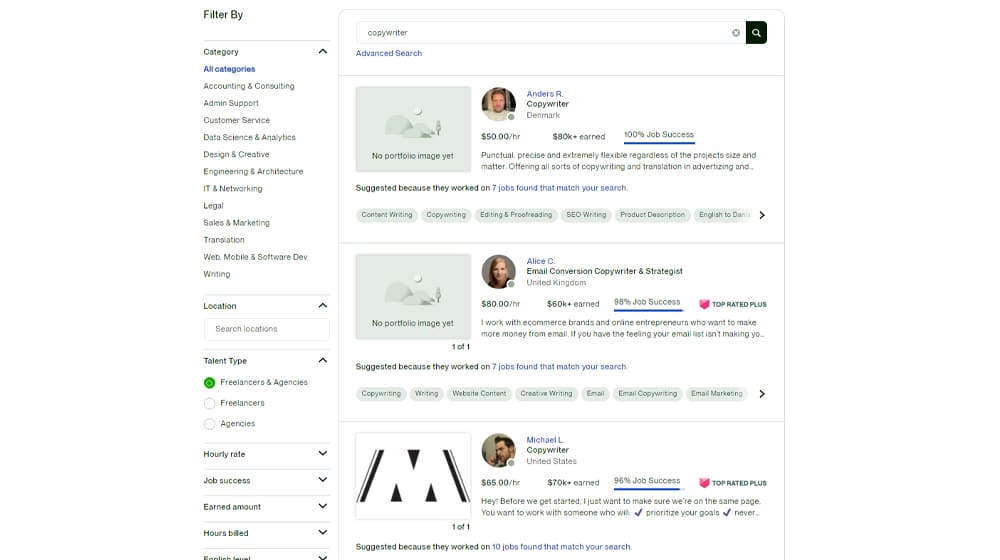When you need content for your website, you probably turn to the internet to look for it. You decide you need to hire a writer to write your copy for you, so naturally, you seek out a copywriter. How can you hire a copywriter and make sure you get an effective, skilled, and affordable freelancer on your side?
Here's a process you can follow.
The first thing you need to do is understand what you're actually asking for and whether or not you really need it.
Copywriting, despite its common use as a general term for business writing, is a specialized field. So, if you're looking for a copywriter, you're going to get two types of people. The first are the people who specialize in copywriting. The second are people who don't really know their way around the industry but know "copywriting" is a buzzword they can use to attract clients.
For obvious reasons, one of these two is a lot worse for you than the other.
So what, specifically, is copywriting?

 Copywriters are usually specialized writers who create marketing-focused content. They write mid-funnel and deep-funnel content meant to take warm leads and convert them into customers. It's usually sales-focused and advertising copy, though it doesn't necessarily need to be ad copy. Persuasive landing pages, product comparisons, and compelling USP demonstrations are all forms of sales copy and all written by copywriters.
Copywriters are usually specialized writers who create marketing-focused content. They write mid-funnel and deep-funnel content meant to take warm leads and convert them into customers. It's usually sales-focused and advertising copy, though it doesn't necessarily need to be ad copy. Persuasive landing pages, product comparisons, and compelling USP demonstrations are all forms of sales copy and all written by copywriters.By contrast, general website pages, blog posts, eBooks, white papers, and other kinds of content are generally not considered sales copy and are the domain of content writers or blog writers instead. If you want a full rundown of the differences between content writers, blog writers, and copywriters, I wrote a guide here for you.
The first part of the process of hiring a copywriter is knowing what you'll get from a copywriter and whether or not that's what you need. If you need someone to write blog posts, eBooks, and general website pages, you don't need a copywriter. If you want someone to work on ads and promotional content, a copywriter is much more useful.
You may also want to ask yourself if "copy" is really what you need. A common problem is businesses who think their ad copy just isn't good enough when the copy isn't the problem. If your issue is "it's not converting," you may have problems with your funnel, your offer, your visibility, or even your reputation, and copywriting isn't going to solve those for you.
The second thing you need to do is understand what's important (and what's not) when you're evaluating potential copywriters.
First of all, having "copywriter" in their freelancer profile or website isn't meaningful. As I mentioned above, many people think of copywriting as generic business writing and call anything that isn't fiction copy. This makes it hard to draw the line between people who are actual sales-focused copywriters and people who are just generic writers.
You want copywriters who talk about sales psychology, who understand consumer buying habits, and who ask pointed questions about your sales process, your offer, and your goals. Generic content writers are fine for some purposes, but they aren't copywriters and shouldn't be the ones writing your PPC ad copy.

Another thing that might come up is certification. There are hundreds of programs on the internet that offer copywriting certification, and they range from outright scams to virtually meaningless to actually meaningful. A course from Coursera isn't going to be valuable, but a certification from HubSpot may very well be. More often, though, you want certifications, skills, or past experience with your niche, not just with copywriting.
I wrote a more detailed breakdown of copywriting certificates over here. It's good reading if you aren't sure what you're looking for.
Copywriters, since they are such a potent resource for conversions, can be worth their weight in gold. The best copywriters in the industry can pull in six-figure incomes very easily. They also bring in that much value and more with optimized, relevant, and compelling copy. Excellent, experienced copywriters can pull in five figures for a single sales page, and companies will pay it without blinking because they know just how valuable an optimized sales page can be.
 Do you need that kind of performance? Can you pay for that kind of performance? The answer to one or both of these may very well be "no," and that's okay.
Do you need that kind of performance? Can you pay for that kind of performance? The answer to one or both of these may very well be "no," and that's okay.When your copy isn't going to make or break million-dollar deals, you probably don't need to pay for the best copywriters in the industry. You won't want to settle for the bottom of the barrel, of course, but you don't need to skim off the cream of the crop, either.
Budget is, of course, a primary concern. Most copywriters charge per word, though there are other payment models as well, so familiarize yourself with each and figure out what a reasonable budget is for your needs.

Speaking of needs, you should also define the general volume and format of the work you need to be done.
All of this sets expectations for volume, consistency, and turnaround time for the work you need to be written. Some writers won't be able to take on high-volume work, while others prefer it over sporadic, low-volume work.
All of this information is also useful for when you create job postings or pitches to send to freelancers. Not coincidentally, that's the next step.
There are generally two ways to find freelance copywriters to hire. You can post job opportunities on job sites like this one (we have a job board!) and have them come to you, or you can go out looking for copywriters and pitch them your offer.
Each option has pros and cons. Posting job opportunities could miss a lot of the better freelancers who are used to people coming to them. It may also attract more applicants from people who don't actually have the skills to meet your needs. On the other hand, it's a lot more passive up until you're interviewing and testing your candidates.
On the other hand, going to freelancers requires a lot more effort on your part, but you know more or less what you're getting based on the profiles and experiences of the freelancers. You may be able to do some research, pick a good match, pitch them, and get your copywriter without having to deal with anyone else.

Some unique options for finding good copywriters include:
You also always have the option of going with the standard sources, like asking copywriting Reddits, looking for freelancers on Fiverr/Upwork/Freelancer, and Facebook or LinkedIn groups.
Either way, sooner or later, you're going to find potential copywriters who are interested in the work you have available (and the money you have to pay for it) and come knocking. How do you find the good copywriters and weed out the ones that don't meet your needs?
I always say two things for any business looking to hire a writer of any sort.
Luckily, it's very easy to do this. How? Just give them a real assignment. You've already pitched them (or they've applied) with a description of the work you'll need them to do. So, have them do some. Now, since this is a test, you are under no obligation to use the work they produce if it doesn't turn out well.
What better test can there be than actually doing the work? You don't need to throw them in the deep end – just a couple of deliverables is fine – but you want to have them do enough that you can judge things like their turnaround time, the quality of their work, and their adherence to your brief and needs.

The key to a good test is not just that you give them an assignment and they complete it. You should also consider finding something to give them feedback on and ask them to revise, edit, or adjust their work. Even if what they gave you was great, you still want to see how they react to having to revise their work.
Of course, this can be tricky if the work they gave you was actually great. But then again, if they're that outstanding, maybe you don't need to test them further. Chances are, though, they won't be that outstanding right out of the gate.
You'll also want to do your due diligence, of course. Make sure the copy they produce is unique and not plagiarized from somewhere, for example. It's relatively tricky to ensure unique ad copy in short formats, but for something longer, like a landing page, you have more opportunities to check.
Picking up your copywriter (or more than one if you need a team and have a lot of deliverables you need to be handled) is really the easiest part.
One thing you want to make sure of is the contract. Some writers, especially old hands in the industry, will have their own contracts they present to any prospective client. Make sure to read and understand any contract you sign, of course. Alternatively, your writer might not have a contract of their own, and you'll want to bring one to the table. Here are a few contract templates you can check out.
And yes, you do want a contract. It might seem like a lot of hassle, but if you ever have a falling out with your writer, hassle is the least of the descriptors you might use for the fallout.
You may also consider hiring them as an employee. Not all freelancers are up for this; many value their freedom more than they value your consistency. Others may jump at the chance. Remember that if you're hiring them as an employee, you can likely pay them less on an hourly basis, but you still want to provide benefits that make it worthwhile.

Once you've hired your writers, it's time to get to work. Ideally, they'll be able to hit the ground running, though a lot of it depends on your ability to explain what you need in a way they can work with. Good copywriters can ask questions to get the information they need out of you either way, though.
Sometimes, the writer you hire doesn't really work out. They seemed great at first glance, but they started to put in less effort over time. Or, they don't seem to be great at communicating, or they don't fit your culture. There's no shame in a hire that doesn't work out; it just means you need to go back to the top of the process and start again.
If you're looking for talented freelance writers, there are certainly many places around the web to find them. My job board is one such place. I encourage you to post your opportunities to the board and hire a writer who meets your needs. It sure beats Indeed or the content mills, that's for sure!